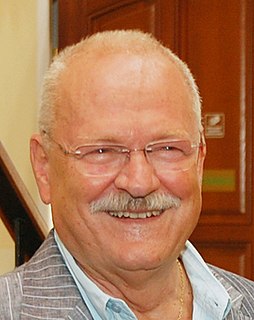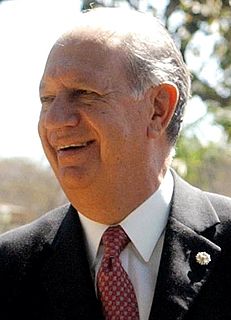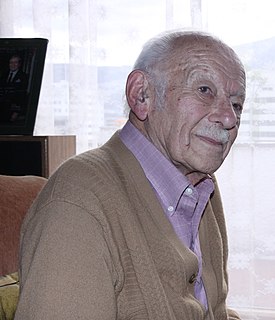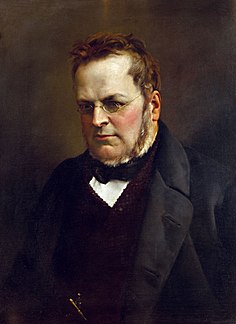
Presidential elections were held in Croatia in January 2000, the third since independence in 1991. They were also the first early presidential elections, as they were held due to the death of incumbent president Franjo Tuđman on 10 December 1999, as well as being the last elections held under the semi-presidential system of government, by which the President was the most powerful official in the government structure and could appoint and dismiss the Prime Minister and their cabinet.

Presidential elections were held in Slovakia on 3 April 2004, with a second round on 17 April. Although former Prime Minister Vladimír Mečiar received the most votes in the first round, he was defeated by Ivan Gašparovič in the run-off.

Presidential elections were held in Chile on 12 December 1999, with a second round run-off on 16 January 2000. The result was a victory for Ricardo Lagos of the Concert of Parties for Democracy alliance, who received 51% of the vote in the second round.
The Greens of Andorra is a green political party in Andorra.

Federal elections were held in Germany on 12 January 1912. Although the Social Democratic Party (SPD) had received the most votes in every election since 1890, they had never won the most seats, and in the 1907 elections they had won fewer than half the seats of the Centre Party despite receiving over a million more votes. However, this election saw the party win more than double the number of votes of the second-placed Centre Party and become the largest party, winning 110 of the 397 seats.

Presidential elections were held in Slovakia on 15 May 1999, with a second round on 29 May. Following a constitutional amendment in 1998 that introduced direct presidential elections for the first time, they resulted in a victory for Rudolf Schuster, who received 57.2% of the vote in the run-off.

Parliamentary elections were held in Hungary on 10 May 1998, with a second round of voting in 175 of the 176 single member constituencies on 24 May.

Presidential elections were held in Moldova on 17 November 1996, with a second round on 1 December. Whilst incumbent President Mircea Snegur received the most votes in the first round, he was defeated in the second by Petru Lucinschi.

General elections were held in Ecuador on 19 May 1996, with a second round of the presidential elections on 7 July. Although Jaime Nebot of the Social Christian Party received the most votes in the first round, Abdalá Bucaram of the Ecuadorian Roldosist Party won the run-off with 54.5% of the vote. The Social Christian Party remained the largest in the Chamber of Deputies, winning 27 of the 82 seats.

General elections were held in Ecuador on 17 May 1992, with a second round of the presidential elections on 5 July. The presidential elections resulted in a victory for Sixto Durán Ballén of the Republican Union Party–Conservative Party alliance, who received 57.3% of the vote in the run-off. The Social Christian Party emerged as the largest party in the House of Representatives, winning 21 of the 77 seats.

Presidential elections were held in the Comoros on 4 March 1990, with a second round on 11 March. The elections had originally been scheduled for January, but were postponed, resulting in demonstrations. Elections were held on 18 February, but were abandoned due to fraud allegations.

Parliamentary elections were held in Andorra on 10 December 1989, with a second round of voting on 17 December. Following the elections, Òscar Ribas Reig became Prime Minister, elected on 12 January 1990 by a vote of 23−5.

General elections were held in Italy on 27 January 1861, with a second round on 3 February. The newly elected Parliament first convened in Turin on 4 March 1861, where, thirteen days later, it declared the unification of the country as the Kingdom of Italy.

General elections were held in Italy on 29 October 1882, with a second round of voting on 5 November. The "ministerial" left-wing bloc emerged as the largest in Parliament, winning 289 of the 508 seats.

General elections were held in Liechtenstein on 11 March 1918, with a second round on 18 March. They were the first elections held in the country contested by political parties, as the Christian-Social People's Party and Progressive Citizens' Party had been founded that year. The Progressive Citizens' Party emerged as the largest in the Landtag, winning seven of the 12 elected seats.

General elections were held in Macedonia on 16 October 1994 to elect a President and Assembly, with a second round of Assembly elections on 30 October. The presidential election was won by Kiro Gligorov of the Alliance for Macedonia, whilst the parties forming Alliance for Macedonia also won the Assembly elections with 95 of the 120 seats. However, the second round of the Assembly elections were boycotted by VMRO-DPMNE and the Democratic Party, as they claimed there had been irregularities in the first round.

Parliamentary elections were held in the Socialist Republic of Macedonia on 11 November 1990, with a second round on 25 November. They were the first competitive elections in the country's history. VMRO-DPMNE emerged as the largest party, winning 38 of the 120 seats.

General elections were held in Ecuador in 1978 and 1979. The first round of the presidential election was held on 16 July 1978, with a second round held alongside parliamentary elections on 29 April 1979. The presidential election was won by Jaime Roldós Aguilera of the Concentration of People's Forces (CPF), who received 68.5% of the vote in the run-off, becoming the country's first freely-elected president. The CPF emerged as the largest party in the National Congress, winning 29 of the 69 seats.

The Social Democratic Party of Macedonia is a political party in North Macedonia.

Federal elections were held in Switzerland on 27 October 1872. The Radical Left remained the largest group in the National Council.

























